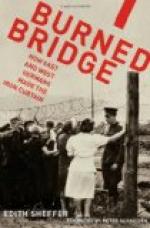And in the meantime both men, and other men likewise, went about their daily affairs. Vancouver grew and prospered, and the growth of Summit sales left an increasing balance on the profit side of Thompson’s ledger. Moreover the rapid and steady growth of his business kept his mind on the business. It worked out—his business preoccupation—much in the manner of the old story of fleas and dogs, to wit: a certain number of fleas is good for a dog. They keep him from brooding over the fact that he is a dog.
So, save for the fact that he continued to make money and was busy and realized now and then that he had come to a disheartening impasse with Sophie, the late spring of 1916 found Thompson mentally, morally and spiritually holding fast by certain props.
He had come a long way, and he had yet a long way to go. He had come to Lone Moose very much after the fashion of St. Simeon Stylites all prepared to mount a spiritual pillar and make a bid for sainthood. But pillar hermits, he discovered, when harsh, material facts tore the evangelistic blinkers off his eyes, were neither useful in the world nor acceptable on high. He had been in a very bad way for awhile. When a man loses his own self-respect and the faith of his fathers at one stroke he is apt to suffer intensely. Thompson had not quite reached that pass, when he came down to Wrangel by the sea, but he was not far off. When he looked back, he could scarcely trace by what successive steps he had traveled. But he had got up out of that puddle into which a harsh environment and wounded egotism had cast him. He was in a way to be what the world called a success.
He was not so sure of that himself. But he stayed himself with certain props, as before mentioned. The base of more than one of these useful supports had been undermined some time before by a sequence of events which presented the paradox of being familiar to him and still beyond his comprehension.
He was a long way from being aware, in those early summer days of 1916, that before long some of the aforementioned props were to buckle under him with strange and disturbing circumstance.
CHAPTER XXIII
THE FUSE—
It was in this period that certain phases of the war began to shake the foundation of things. I do not recall who said that an army marches on its stomach, but it is true, and it is no less a verity that nations function primarily on food. The submarine was waxing to its zenith now, and Europe saw the gaunt wolf at its door. Men cried for more ships. Cost became secondary. A vessel paid for herself if she landed but two cargoes in an Allied port.
Every demand in the economic field produces a supply. On this side of the Atlantic great shipbuilding plants arose by some superior magic of construction in ports where the building of ships had been a minor industry. In this Vancouver did not lag. Wooden ships could be built quickly. Virgin forests of fir and cedar stood at Vancouver’s very door. Wherefore yards, capable of turning out a three-thousand-ton wooden steamer in ninety days, rose on tidewater, and an army of labor sawed and hammered and shaped to the ultimate confusion of the Hun.




